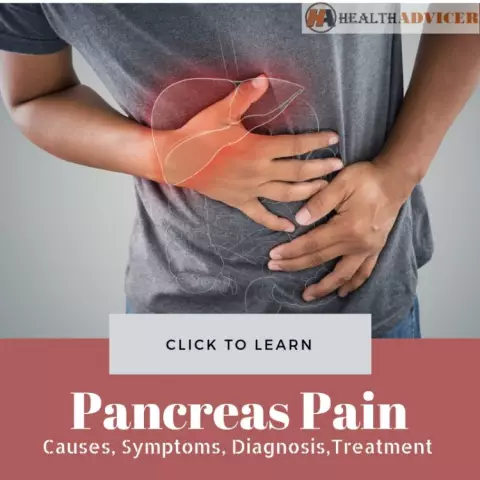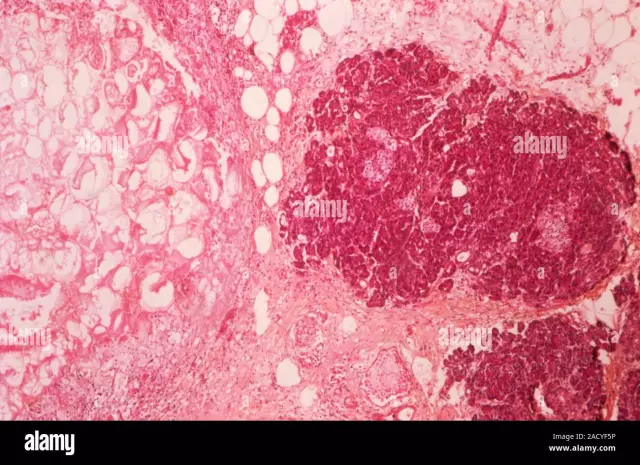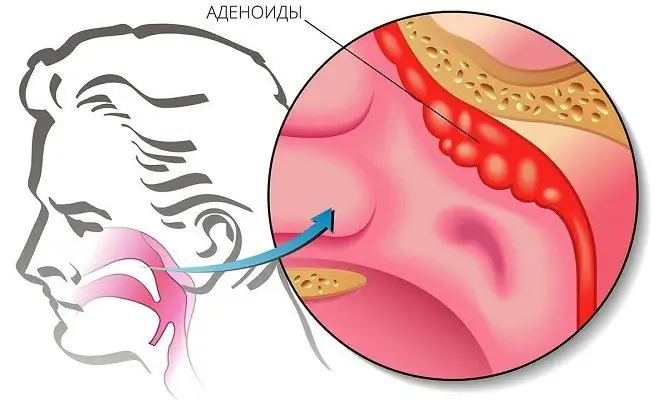- Author Rachel Wainwright wainwright@abchealthonline.com.
- Public 2023-12-15 07:39.
- Last modified 2025-11-02 20:14.
Insulinoma

Insulinoma is one of the types of tumors that secretes a significant amount of insulin, which, in turn, leads to frequent development of hypoglycemic attacks in patients (low levels of glucose in the blood serum). Pancreatic insulinoma is most often observed. Very rarely, insulinomas can occur in the small or large intestine, as well as in the liver.
Insulinoma mainly affects people of the most working age from 25 to 55 years. But in children and adolescents, this tumor practically does not occur.
In 90% of cases, pancreatic insulinoma is a benign tumor. In some patients, the appearance of insulinoma is one of the signs of endocrine multiple adenomatosis.
Insulinoma: symptoms
The main manifestation of insulinoma is attacks of hypoglycemia caused by an increased level of insulin in the blood of patients. Patients have sudden attacks of severe general weakness, fatigue, accompanied by tachycardia (heart palpitations), sweating, fear, anxiety. At the same time, patients experience severe hunger. After eating, all these symptoms of insulinoma disappear almost immediately.
The most dangerous course of insulinoma is in patients who do not feel the state of hypoglycemia. In this regard, they cannot take food in time and stabilize their condition. With a further decrease in the concentration of glucose in the blood, their behavior becomes inadequate. Patients experience hallucinations, accompanied by rather vivid and figurative pictures. Drooling, profuse sweating, double vision occurs. The patient may take violent actions against those around him in order to take away their food.
A further drop in the level of glucose in the blood serum leads to an increase in muscle tone, up to an extensive epileptic seizure. Tachycardia builds up, blood pressure rises, and the pupils dilate.
If the patient is not provided with medical care, then hypoglycemic coma occurs. Consciousness is lost, pupils dilate, muscle tone decreases, sweating stops, heart and breathing rhythm is disturbed, blood pressure drops. Against the background of a hypoglycemic coma, the patient may develop cerebral edema.
In addition to attacks of hypoglycemia, another symptom of insulinoma is an increase in body weight up to the development of obesity.
It is very important that not only patients, but also their closest relatives know the symptoms of insulinoma well, so that they can interrupt the hypoglycemic attack in a timely manner, preventing the development of psychosis or coma.
Deficiency of glucose has a detrimental effect on the neurons of the brain. Therefore, frequent and prolonged coma with insulinoma can cause a patient to develop discirculatory encephalopathy, parkinsonism, and convulsive syndrome.
Insulinoma diagnostics
Insulinoma diagnosis is sometimes difficult. If a person is suspected of insulin, they are hospitalized and under close medical supervision they are prescribed fasting for 24 to 72 hours. When symptoms of insulinoma appear, blood is taken from the patient to determine the glucose and insulin content in it. Insulinoma is indicated by low glucose and high insulin levels.

At the next diagnostic stage, the exact location of the insulinoma is identified. To do this, perform magnetic resonance or computed tomography, ultrasound. In some cases, diagnostic laparoscopy or laparotomy may be required.
Insulinoma: treatment
The main treatment for insulinoma is surgery. In its course, the tumor is removed within healthy tissues.
In cases where the surgical treatment of insulinoma for any reason cannot be performed, conservative therapy is prescribed. It consists in rational nutrition of patients, timely relief of hypoglycemic attacks, drug therapy aimed at improving metabolic processes in the brain.
To stop a hypoglycemic attack, the easiest way is to offer the patient a glass of sweet hot tea or candy. In case of impaired consciousness, a glucose solution should be injected intravenously. When an attack of psychosis or hypoglycemic coma develops, an ambulance team should be called immediately.
YouTube video related to the article:
The information is generalized and provided for informational purposes only. At the first sign of illness, see your doctor. Self-medication is hazardous to health!






